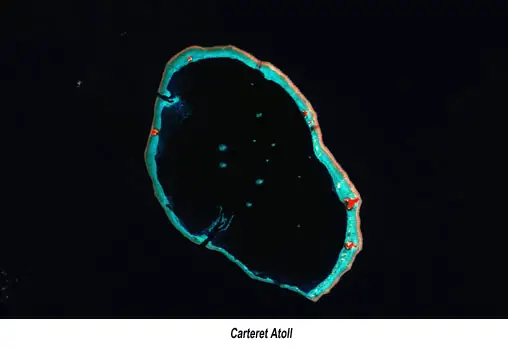
Yup, we're sinking. The day has finally come, and a critical landmark in the saga of global climate change is occurring as we speak—and hardly anyone has noticed. The Carteret Islanders of Papua New Guinea have become the world's first entire community to be displaced by climate change. They're the first official refugees of global warming - and they're packing up their lives to move out of the way of ever-rising waters that threaten to overtake their homes and crops. The island they call home will be completely underwater by 2015. The Ecologist:
The evacuation of the Carteret Islands have begun. This morning I stood on black volcanic sand, pressed up right against the jungle, and watched a small white boat powered by a single outboard engine run in against the shore. On board were five men from the Islands, the fathers of five families, who have come to finish building houses and gardens already begun in a cleared patch of jungle at Tinputz, on the east coast of Bougainville. When these homes are ready the five will return to the Carterets, to fetch their wives and children back. Life, they hope, will be better for them here. On the Carterets, king tides have washed away their crops and rising sea levels poisoned those that remain with salt. The people have been forced to move.
The men climbed silently from the boat and into the shallows. They splashed towards us, carrying almost nothing. From beside me, others who had come to meet them walked out quietly in welcome. The air was still, both sad and happy, which seemed to suit the moment. That single boat carrying these five men is the first wave in what is, as far as I can tell, the world’s first official evacuation of an entire people because of climate change. Some say they will be ready to bring their families here next month when the houses are completed. Others that it will be June, when the first crop of sweet potatoes will be ready to feed them.
It was a combination of a little planning and a lot of luck that allowed me to be among the very few to see this. I heard the evacuation was beginning only yesterday, a day after arriving in Buka. It has been on again and off again many times over the past year, but Papua New Guinea seems to like throwing surprises. Given the chance to be there when it finally began, I leapt and travelled to Tinputz this morning, first by boat across Buka passage, which separates the island on which I am staying from Bougainville, and then through the jungle in the back tray of a Toyota Hilux 4-wheel drive with a crowd of local people. Some were from the NGO the Carterets established to broker their own move. Others were from the Carterets themselves, who had travelled to Buka on trading boats and wanted to be at Tinputz to welcome their friends. There were also a Kiwi and an Aussie, Kim and Kirsten, who have spent months as volunteers working towards today. We arrived only minutes before the boat itself.
After the arrival, the men sat in the shade of two unfinished timber frame houses among the trees – the beginnings of the homes they are to complete. The women cooked; clams and corned beef sandwiches, greens, rice and cassava wrapped in palm leaves. After hours the two parties came together to eat, to pray and to formally welcome the newcomers to Tinputz. There were speeches in Tok Pisin, only a little of which I followed. The five fathers sat in a line and nodded their heads in silence.
On the ride home, hundreds of children streamed along the road, in bright white shirts above blood red skirts and trousers, proving completely false my first thought that the dense forest on either side must be uninhabited. The only bitter taste to today came also on this return journey, riding high on the tray of the Toyota. We hit and killed a pig and then a dog that scampered out into the jungle road; fortunately our driver had no licence plate, or the call for retribution would have been swift (this is a country that puts a pig on its 20 kina note). A full beer-bottle also came screaming at us from a passing truck, but shattered harmlessly on the road. Possibly it was aimed at me, the only white guy in sight. At least that is what the others with me in the Toyota thought. On the other hand, I saw a man carrying a stone-tipped spear along the road, which is also something you don’t see every day.

No comments:
Post a Comment